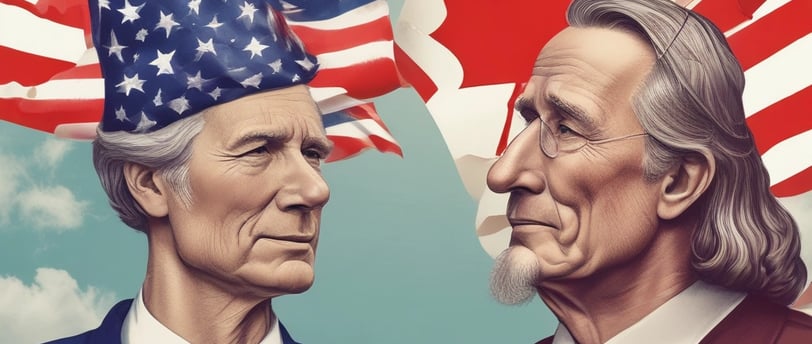Why America Wants Canada as the 51st State—and Why Canada Says No
Why the U.S. Wants Canada as Its 51st State—and Why Canada Stands Firm. Explore the intriguing hypothetical scenario of Canada becoming America's 51st state. Delve into the economic, strategic, and cultural reasons why some in the U.S. entertain this idea, and uncover the key reasons Canada firmly rejects it, from sovereignty to social values. A thought-provoking look at the dynamics of these two close neighbors.
TRENDING IN CANADA
Yogi B
1/9/20253 min read


Why America Wants Canada as the 51st State—and Why Canada Says No
The idea of Canada becoming the 51st state of the United States is not new; it has surfaced as a topic of speculation, humor, and debate over the decades. While no official movement exists to merge the two countries, the concept raises fascinating questions about economic, cultural, and political dynamics. Here's a deeper look into why some in the U.S. might entertain this idea—and why Canada is resolutely against it.
America's Interest in Canada as the 51st State
1. Shared Border and Trade Interdependence
The U.S. and Canada share the world’s longest undefended border, stretching over 5,500 miles. They are each other's largest trading partners, with bilateral trade exceeding $700 billion annually. Some proponents argue that unification could streamline trade, eliminate border delays, and create a stronger North American economy.
2. Canada's Natural Resources
Canada is rich in natural resources, including oil, timber, and fresh water. For an energy-hungry and resource-intensive nation like the U.S., having direct access to Canada's resources could bolster its energy security and global economic leverage.
3. Strategic Advantages
A unified North America would create a geopolitical powerhouse. The addition of Canada’s vast territory and Arctic resources could enhance the U.S.'s influence in global politics and environmental matters, particularly in the face of climate change and shifting Arctic sovereignty issues.
4. Cultural and Linguistic Similarities
Both countries share cultural, linguistic, and historical ties. English is the dominant language, and many American and Canadian traditions overlap, making some argue that integration would be relatively seamless compared to other multinational unions.
Why Canada Refuses
1. Cultural and Political Sovereignty
Canada has its own distinct identity, rooted in multiculturalism, bilingualism (English and French), and parliamentary democracy. Joining the U.S. would likely erode Canada’s sovereignty, including its ability to shape policies on healthcare, gun control, and immigration, which differ significantly from American approaches.
2. Social and Economic Values
Canadians pride themselves on social programs like universal healthcare and robust social safety nets. The U.S.’s more privatized systems and differing views on issues such as healthcare and social equity make the idea of integration unappealing to many Canadians.
3. Historical Independence
Canada’s evolution as an independent nation—separate from British colonial rule and distinct from American independence—is a source of pride. Merging with the U.S. could undermine centuries of history and diminish Canada’s international identity.
4. Public Opinion
Polls consistently show that Canadians overwhelmingly reject the idea of becoming part of the United States. Many see such discussions as undermining their national pride and independence.
5. Quebec and Indigenous Concerns
Quebec’s French-speaking population values its unique language and culture. A merger with the U.S. could exacerbate tensions within Quebec, possibly reigniting separatist movements. Additionally, Indigenous communities have unique governance structures and agreements with the Canadian government that would be jeopardized under U.S. jurisdiction.
Hypothetical Challenges of a Union
Even if such a union were entertained, it would face significant obstacles:
Constitutional Barriers: The U.S. Constitution and Canada’s Constitution Act would require complex amendments, necessitating widespread political consensus.
Economic Realignment: Harmonizing tax systems, currencies, and regulations would be a herculean task.
Cultural Resistance: Both Canadians and Americans value their distinct identities, making the social integration challenging.
Why the Status Quo Prevails
The idea of Canada becoming America’s 51st state is largely speculative and hypothetical. While the U.S. might benefit from Canada's resources and strategic location, Canada’s commitment to its sovereignty, values, and unique identity ensures that the "Great White North" remains proudly independent.
Ultimately, the deep friendship and partnership between the two nations flourish precisely because of their differences, not despite them. Maintaining their autonomy allows both countries to collaborate on global challenges while preserving their unique strengths and cultures.
